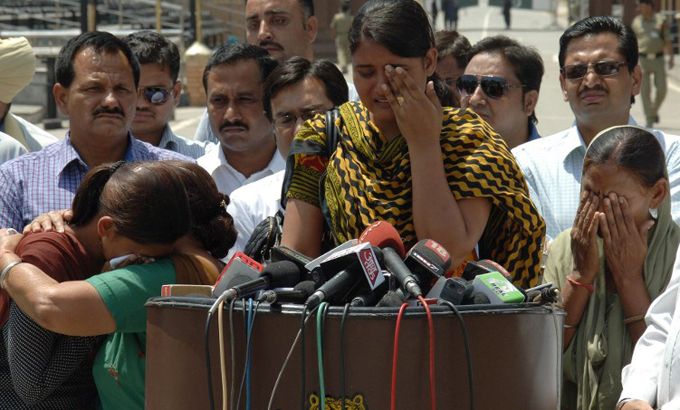Indian ‘spy’ attacked in Pakistan jail dies
Prisoners used bricks to attack Sarabjit Singh, whose family is demanding his body is returned to India.

An Indian national on death row in Pakistan who was attacked last week by fellow inmates has died from his injuries, his lawyer and a doctor said.
Sarabjit Singh, who was sentenced to death in 1991 on espionage charges, died early on Thursday, after lying in a comatose state for the last five days, a senior doctor at Jinnah hospital in Pakistan’s eastern city of Lahore.
“The criminals responsible for the barbaric and murderous attack on Sarabjit Singh must be brought to justice,” Indian Prime Minister Manmohan Singh said on his official Twitter page.
Singh’s relatives are calling for his body to be returned.
The prime minister added that New Delhi would make the necessary arrangements to bring his body home for funeral rites, after earlier negotiations to treat the jailed spy in India or a third country failed.
Singh’s lawyer Owais Sheikh confirmed the 49-year-old’s death and said that his body “has been moved to the hospital mortuary”.
The doctor who spoke to AFP said arrangements were under way for an autopsy.
Singh sustained several injuries, including a fractured skull, when six prisoners attacked him on Friday last week, hitting him on the head with bricks.
“[His death] was already feared. His condition was more than critical and he had less chances of survival,” Sheikh said.
Pakistan insists regular consular access was granted to Singh and said doctors did everything possible to save him before his death from cardiac arrest.
There were angry protests in Singh’s native Bhikhiwind village in northern Punjab state, where Pakistan flags were burned.
His lawyer earlier said that his client had received threats following the execution of a Kashmiri separatist in India.
Mohammed Afzal Guru was hanged in New Delhi on February 9 for his part in a deadly Islamist attack on the Indian parliament in 2001.
Mercy petitions
Singh was convicted for his alleged involvement in a string of bomb attacks in Pakistan’s Punjab province that killed 14 people in 1990. His mercy petitions were rejected by the courts and former president Pervez Musharraf.
His family insisted he was a victim of mistaken identity and had inadvertently strayed across the border while drunk.
Four members of Singh’s family – his wife, two daughters and his sister – who travelled to Lahore on Tuesday have since returned to India, according to Indian media.
A senior official in Delhi had said diplomats from the high commission in Islamabad were not allowed to visit Singh in hospital, and had also complained about a lack of information on the prisoner’s condition.
Pakistan’s foreign ministry, however, insisted Indian diplomats in Lahore were given access to Singh on two occasions.
The Human Rights Commission of Pakistan condemned the attack on Singh as a “dastardly act” and called on the government to make a thorough inquiry into the matter and punish the guilty persons.
“The authorities have obviously failed to do their elementary duty” of providing him safety and security, the commission said in a statement.
The attack made front-page news in Indian newspapers, with Indian television stations running frequent updates on his condition.
Pakistan last year released an Indian man who had served three decades in a Pakistani jail on espionage charges.
It is unclear how the death will affect the relationship between Pakistan and India, two nuclear-armed neighbours who are longtime enemies, who have fought three major wars since they achieved independence from Britain in 1947.
In recent years relations have warmed somewhat, especially with regard to trade.